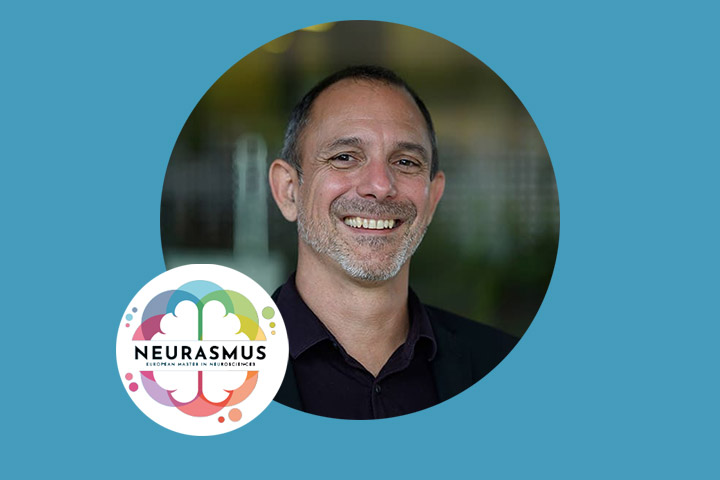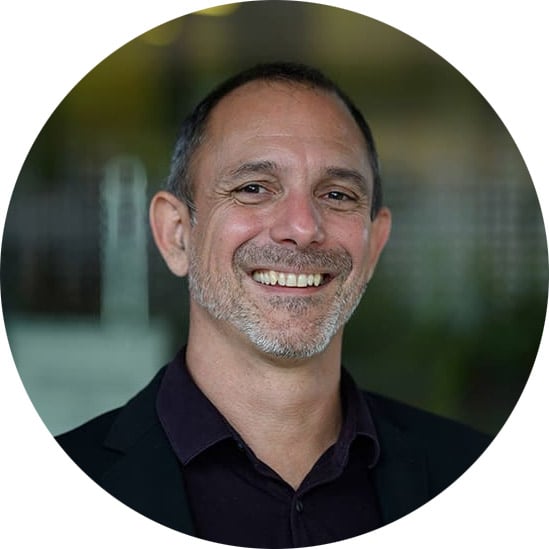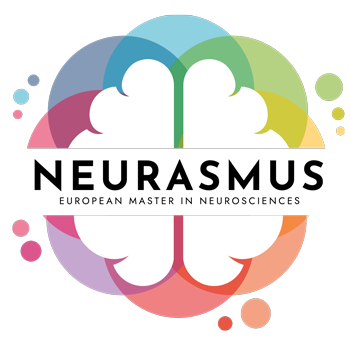
Neurasmus: renewal of funding by the European Commission
In the summer of 2025, the European Commission announced that it would be renewing funding for the Neurasmus programme for a further six years, covering four cohorts. This will enable around twenty student grants to be awarded each year. We met with Pascal Fossat, professor at the University of Bordeaux and coordinator of the programme since 2022.
 Bordeaux Neurocampus: Could you remind us what the Neurasmus programme is?
Bordeaux Neurocampus: Could you remind us what the Neurasmus programme is?
Pascal Fossat: Neurasmus is a European Master’s programme in Neuroscience that was launched in 2011. It combines the expertise of several universities and offers a programme involving at least two international mobility periods. Neurasmus is unique in that it offers an ‘à la carte’ programme where students can choose their programme based on the specialisations of the partner universities’ Master’s degrees – for example, neural circuits in Bordeaux, neurophotonics in Laval, etc.
Each year, this Master’s programme welcomes a new cohort of 20 students from all over the world. To date, more than 50 nationalities have been represented! Since the programme was created, 241 students have participated in it. With the number of applications growing every year, we now receive 1,000 applications per year.
It is therefore a master’s programme that many students dream of attending. Have the results been as expected since 2011?
Absolutely. Of the 181 alumni from the 2011 to 2021 cohorts that we track, 99.9% currently have a professional position in a scientific field related to neuroscience as a teacher, engineer, researcher, or business leader. Three-quarters of our alumni went on to obtain a PhD in neuroscience after completing their master’s degree. And since the international aspect is so important, I would point out that 60% are in Europe and 25% are in the United Kingdom, the United States, and Canada. Only 2.5% have returned to their country of origin. We can also be proud of our scientific output, as over the years, 686 articles have been co-authored by a Neurasmus student or former student, which is about four articles per alumnus.
Does this renewal go hand in hand with new developments?
. Université de Bordeaux
. Universidade Coimbra – Portugal
. Georg-August-Universität Göttingen – Allemagne
. Charité – Universitätsmedizin Berlin – Allemagne
. Université de Laval au Québec – Canada
. University of Galway – Irlande
The major new development is the arrival of the University of Galway in Ireland, which has joined the group of partner universities – i.e. those that award the degree – to contribute its expertise in neuropharmacology. Galway is also a partner in the ENLIGHT European university project, as are Göttingen and Bordeaux. But Neurasmus also has many academic partners, such as the Vrije Universiteit Amsterdam, which is in charge of open science, as well as Bonn and Taiwan, which host internships.
Furthermore, the question of meaning is very much present in our FAIR approach to science: ‘Findable, Accessible, Interoperable, Reusable’. We believe in transparent, ethical and responsible research and we do everything we can to make it a reality.
Aware that academic fields remain limited to a small number of students, we also want to open up students’ perspectives to other professional fields to enable them to make informed choices about their future careers. We have therefore established partnerships with eight private companies, including three in Bordeaux: Apateya, AquiNeuro and TreeFrog.
Finally, we want students to be exposed to the lives of patients at an early stage so that they can fully understand the challenges of neurological disorders in all their dimensions. To this end, we have established partnerships with La Maison du Cerveau and France Parkinson. This allows students to get closer to patients and gives more meaning and a new dimension to their training.
Is Neurasmus a team?
Of course, we have a team of teacher-researchers with all our partners, and the programme would not be what it is without our project manager, Jessica Baranger, who does a tremendous job. We are committed to continuing this momentum.
The intercultural dimension contributes to the richness of this master’s programme. But being far from family is sometimes difficult for students. Is this a challenge for such a programme?
It is certainly something we need to be mindful of, because for some students, this is their first experience away from their city, their country or even their continent. We want to take an approach focused on well-being: a clinical psychologist has been associated with the programme for many years and follow-up sessions are covered by the programme as needed.
And when, at the end of the two years, you see the bonds that unite the students in each cohort, despite their initial differences and cultural diversity, as they embrace each other to congratulate one another and celebrate their graduation, it is very emotional.
Is a renewal something to celebrate?
Despite the immense joy that renewal brings, we are not going to celebrate it as such. However, I invite you to join us on 16 July 2026 to celebrate the 15th anniversary of the Neurasmus Master’s programme! It is still a little too early to reveal the programme, but a scientific day attended by alumni will be organised in Bordeaux. Save the date!
 More information about the program
More information about the program
Website: neurasmus.u-bordeaux.fr
Last update 22/10/25
